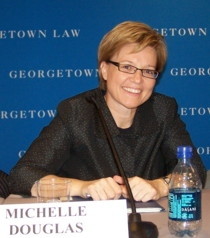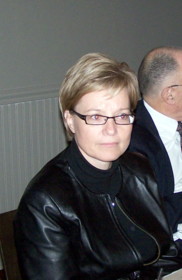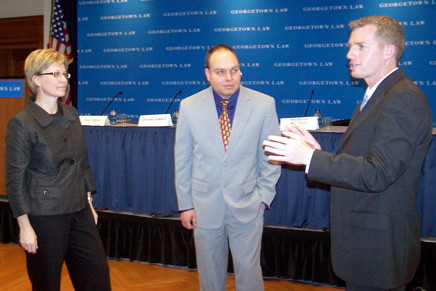|
OH
CANADA!
Michelle
Douglas'
struggle in ending
discrimination
in Canada's military
by Denny Meyer |
 |
The
United States of America's northern neighbor Canada,
with whom we share a 5,525 mile border, has allowed
open service by LGBT patriots since 1992,
as have most of our allied nations. Is there a
clear and present danger that the homosexual hordes of
Canada's defence forces will flood across our sacred
border in an infidel invasion, shouting
incomprehensible French battle cries? Its not
bloody likely; in fact gay Americans have been
traveling into Canada since 2003 to marry and enjoy
the hospitality, hockey and holidays under the maple
leaf flag.
In
Canada, in 1989, Second Lieutenant Michelle Douglas
was honorably dismissed due to homosexuality.
She subsequently sued based on the Canadian Charter
of Rights and Freedoms, which was found to provide
constitutional protection of the rights of LGBT
citizens. The
military settled the case by ending its discriminatory
policy. Ms. Douglas is, thus, essentially
single-handedly responsible for the entire change of
policy regarding LGBT service in Canada. The
policy later evolved to recognize protection for transgender volunteers
as well; and encompasses
perhaps the world's most thoroughly inclusive armed
force affirmation of rights. In Canada, it
seems, there are no caveats or exceptions nor
pragmatic excuses or arguments for exclusion.
The military has
ongoing training regarding respect and dignity and a
policy of zero tolerance for harassment. It is
the first nation to have held a same sex wedding of
uniformed military personnel.

Michelle
Douglas (center) at Georgetown University Law
Center Conference on
Sexual Orientation and Military Preparedness An
International Perspective, March 12, 2008
L-R: Stuart O'Brien (Au), Patrick Lyster-Tidd, (UK),
Michelle Douglas (Canada), Avner Evan-Zohar(
Israel), Mike Rankin (US)
In
addition, according to a Palm
Center white paper,
full partner benefits are available to all of Canada's
service members, including compassionate leave and
partner entitlement to dental care and health care
plans as dependents, among other standard benefits.
Although equality and not economics guided the
Canadian decision making process, the Palm Center's
paper notes that "In April 1999, a report by the
National Defence revealed that 17 claims for medical,
dental and relocation benefits for gay and lesbian
partners of soldiers had been filed in 1998."
So much for fears of breaking the national treasury,
it seems.
(It
should also be noted that the Australian Defence Force
(ADF) has just announced, in December 2008, full
partner benefits; and Israel has provided combat death
benefits to partners for years; despite the fact that
neither country allows same sex marriages to be
performed). In the US, on the other hand, The Military
Readiness Enhancement Act, which would repeal the
Don't Ask Don't Tell policy, specifically excludes
partner benefits, unless DOMA is repealed.
Michelle
Douglas grew up in the Maritime Province of Nova
Scotia. Her father was a civil servant and a
great uncle had served in World War II. After
completing a university degree, Michelle began to
apply for police work and the military was the first
to respond. In 1986, she graduated at the top of
her class in Officer's Basic training and became an
Air Force MP. As Canada is officially bilingual,
she then attended a language training course near
Montreal where she met a woman with whom she fell in
love. What could be more natural for a young
person starting out in life and career? Despite
being discreet about this new relationship, she knew
that the military disapproved of such relationships,
but she had no idea of the dire consequences she was
about to face. Meanwhile, she finished as the
top candidate in her career training course, above
males in the same program. She became the second
female officer to be appointed to the Special
Investigations Unit. Unfortunately, this unit
was, among other things, responsible for investigating
allegations of homosexuality, alas. Her friends,
consequently, shied away; her lover left her and moved
away. She was devastated. At the same
time, someone had reported to the MP authorities that
she'd been spending a lot of time with a woman; this
resulted in an investigation. She was
interrogated for two days about her social life, asked
if she was gay, and was ordered to take a polygraph
test which she refused to do. She also refused
to reveal with whom she associated. But, under
the intense pressure of such an investigation, she
ultimately said that she was a lesbian; although she
had not yet come to apply the label of being a lesbian
to herself, instead she'd simply loved another woman.
Her MP badge was removed, and after serving
temporarily as a general's aid, she was sent home to
await a final disposition of her case. She was
'released honorably' in 1989. The terminology
was, "Not
advantageously employable due to homosexuality,"
(which
quoted directly from a Canadian military regulation on
the subject).
|
At
the time, the Canadian military orders allowed known
homosexuals to continue serving, but permitted no
promotions, no pay raises, no postings, and no
training. In other words, you were in but you
were out, as it were.
Her
family, meanwhile, was supportive. In keeping
with Canadian culture, they were not shocked to find
that she was a lesbian, but they were outraged at her
treatment by the military.
Ms.
Douglas decided to legally challenge her dismissal.
She sued. Canadian law by this time, was
evolving to offer some protection from discrimination
based on sexual orientation; and the military, really,
was not entitled to an exception to that law. In
1992, on the eve of the trial, the military settled,
declaring that her constitutional rights had been
violated, and that she'd been discriminated against.
An immediate order, directly from the Chief of the
Defence Staff, was issued ending the policy of
discrimination. |

|
While
discrimination does not suddenly end with an order,
Ms. Douglas noted, militaries are well suited to
following orders and instituting sensitivity training.
As elsewhere, there had been dire warnings that esprit
d'corps, morale, and operational effectiveness would
be compromised by a change in policy; but, as
elsewhere, none of that happened in Canada either.
Patriotic gay and straight Canadians are serving and
sacrificing in Afghanistan, alongside American troops,
getting the job done. She notes that it has been
nearly 17 years since she won her case. Gay
service is no longer an issue in Canada; she finds it
hard to imagine that such freedom still does not exist
elsewhere. While she had had no intention to
become an activist, she said, she
was resolute in standing up for human rights. She has
gone on to speak out on this issue in Canada, the US
and in Europe. It seems that the need for people to
speak up remains.

Washington
DC, March 12 2008: Michelle Douglas with Avner Evan-Zohar(
Israel)
and Australian Defence Force Chief Petty
Officer Stuart O'Brien
©
2008-2009 Gay Military Signal
|